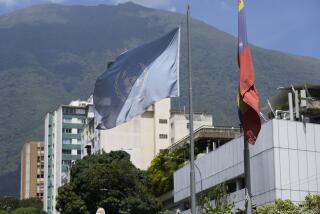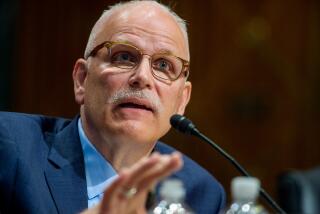U.N. Refugees Commissioner Quits Amid Furor Over Flying First Class
- Share via
UNITED NATIONS — U.N. High Commissioner for Refugees Jean-Pierre Hocke resigned today amid an investigation focusing on his use of U.N. money for first-class air travel.
Secretary General Javier Perez de Cuellar accepted Hocke’s resignation effective Nov. 1, said U.N. spokesman Francois Giuliani.
Hocke, a Swiss, was in New York when his resignation was announced. His letter to Perez de Cuellar, read by Giuliani, said in part:
“At a time when you have decided . . . to prolong and intensify an investigation which you initiated, I do not wish my presence at the head of HCR to complicate in any way the ongoing investigation.”
Hocke in late September admitted that he had flown first class, a right reserved only for Perez de Cuellar under stringent U.N. austerity measures.
Hocke’s four years at the head of the Geneva-based U.N. agency, the protector of refugees worldwide, were plagued by controversy.
The latest erupted in September, when the magazine Swiss Television reported Hocke used a special fund set up by Sweden and Denmark to upgrade his air travel.
The report said internal documents showed Hocke had drawn $300,000 since 1987 from the special “educational account” to upgrade his flights from business to first class.
Hocke said in late September that he had flown first class on some long intercontinental flights when he had a busy work schedule.
The fund was established in the late 1960s and is replenished by Sweden and Denmark.
Hocke said in September that the fund regulations allow a “certain latitude” in disbursement of funds.
The Danish ambassador in Geneva, Mogens Isaksen, replied that this may have been true for Hocke’s predecessor, former Danish Prime Minister Poul Hartling, but it was unclear whether Hocke was also allowed such latitude.
Hocke won the post as high commissioner mainly because he was the favorite candidate of the U.S. State Department, but he has been criticized by his staff and private refugee relief groups for not challenging the increasingly restrictive asylum policies of the United States, West Germany and other major donors to the commission.
In January, 1988, Hocke ordered the burning of all 138,000 copies of the agency’s official monthly magazine Refugees because it contained an article critical of West Germany’s refugee policy.
More to Read
Sign up for Essential California
The most important California stories and recommendations in your inbox every morning.
You may occasionally receive promotional content from the Los Angeles Times.













